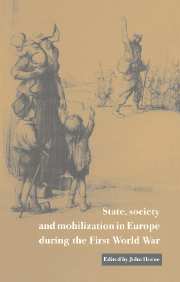1 - Introduction: mobilizing for ‘total war’, 1914–1918
Published online by Cambridge University Press: 04 December 2009
Summary
The subject of this volume is a major feature of the First World War both as an experience and as a shaping event in twentieth-century history. It is the relationship between national mobilization and ‘total war’. The claim is not that this relationship determined the outcome and consequences of the war. Many other factors contributed to both. The argument, rather, is that if we think of the First World War as a trans-national or supra-national phenomenon, this relationship constitutes one of its essential dynamics which, along with others, needs to be explored comparatively across national cases, in order for the nature and significance of the war to be better understood. It is also a theme with obvious comparative relevance for the Second World War and other wars in the twentieth century. The two key terms of the relationship, ‘mobilization’ and ‘total war’, need further definition, however, before the parameters of the book can be indicated and some of the arguments which arise from it developed further.
‘Mobilization’ is used here in a broader sense than is customary in historical analysis of the First World War. The primary process of military mobilization, of raising mass armies from the population and delivering them to the battlefield within the cadres of a professional military establishment, is not the principal subject of investigation. Neither is the secondary process of economic mobilization, which rapidly revealed itself as no less crucial to the outcome of a war waged in the image of the industrialized societies that had generated it, and to which a good deal of attention has been devoted.
- Type
- Chapter
- Information
- Publisher: Cambridge University PressPrint publication year: 1997
- 19
- Cited by

